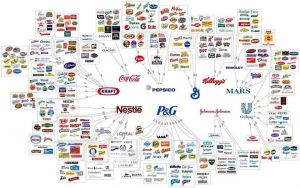Corporation: Difference between revisions
m (→Behaviour) |
mNo edit summary |
||
| Line 3: | Line 3: | ||
The prime driver of all corporate entities is self survival. The second is their fiduciary duty to pursue revenue for the financial gain of employees and shareholders. These paramount, binding principles give corporations a [[Machines|machine]] like quality which if it was a REAL person would meet the diagnostic criteria for [[psychopath|psychopathy]]<ref>Bakan, Joel, The Corporation: The Pathological Pursuit of Profit and Power. New York: Free Press, 2004.</ref>. | The prime driver of all corporate entities is self survival. The second is their fiduciary duty to pursue revenue for the financial gain of employees and shareholders. These paramount, binding principles give corporations a [[Machines|machine]] like quality which if it was a REAL person would meet the diagnostic criteria for [[psychopath|psychopathy]]<ref>Bakan, Joel, The Corporation: The Pathological Pursuit of Profit and Power. New York: Free Press, 2004.</ref>. | ||
These overall traits are compounded by the fact that people with narcissistic traits tend to get promoted 39% faster in their progression to CEO<ref>The Leadership Quarterly: The perks of narcissism: Behaving like a star speeds up career advancement to the CEO position. Published June 2021, Accessed 14th January via https://doi.org/10.1016/j.leaqua.2020.101489</ref> resulting in at least three times as many psychopaths in executive or CEO roles than in the overall population<ref>[https://www.sakkyndig.com/psykologi/artvit/babiak2010.pdf Corporate Psychopathy: Talking the Walk]</ref>. And psychopathic behaviour is bad, for everyone as they only amount to 1% of the adult population, but are reported to be responsible for about 50 % of all serious crimes and constitute 20% of (North American) prison populations<ref> | These overall traits are compounded by the fact that people with narcissistic traits tend to get promoted 39% faster in their progression to CEO<ref>The Leadership Quarterly: The perks of narcissism: Behaving like a star speeds up career advancement to the CEO position. Published June 2021, Accessed 14th January via https://doi.org/10.1016/j.leaqua.2020.101489</ref> resulting in at least three times as many psychopaths in executive or CEO roles than in the overall population<ref>[https://www.sakkyndig.com/psykologi/artvit/babiak2010.pdf Corporate Psychopathy: Talking the Walk]</ref>. And psychopathic behaviour is bad, for everyone as they only amount to 1% of the adult population, but are reported to be responsible for about 50 % of all serious crimes and constitute 20% of (North American) prison populations<ref>'''''Without conscience: The disturbing word of the psychopaths among us''.''' Hare, R. (1999). New York: Guildford Press. https://www.google.com/books/edition/_/xfIEVtzj52YC?hl=en</ref>. | ||
This may seem depressing as we essentially live in a corporatocracy (see '''Figure 1''' and '''Figure 2'''). However, a ray of hope is to remember corporations are simply inert [[machines]], much like a gun, its behaviour is only defined by the intention defined by its founding incorporation statement. Perhaps, if we can change the intention, we can change the effect. Can we write a series foundational rules ([[Tenet|tenets]]) which could be used to make the [[Transparent incorporation statement|incorporation statement]] of a machine which does ''[[Relativity of ethics|good]]?'' | This may seem depressing as we essentially live in a corporatocracy (see '''Figure 1''' and '''Figure 2'''). However, a ray of hope is to remember corporations are simply inert [[machines]], much like a gun, its behaviour is only defined by the intention defined by its founding incorporation statement. Perhaps, if we can change the intention, we can change the effect. Can we write a series foundational rules ([[Tenet|tenets]]) which could be used to make the [[Transparent incorporation statement|incorporation statement]] of a machine which does ''[[Relativity of ethics|good]]?'' | ||
====References==== | ====References==== | ||
<references /> | <references /> | ||
Revision as of 17:54, 28 September 2022


A traditional corporate entity is a collective of people joined together by articles of incorporation in pursuit of profit. Although it may be comprised of individual parts such as directors, officers, and shareholders, a corporation is a legal entity in and of itself. This was determined by Santa Clara County vs Southern Pacific Railway in the U.S. Supreme court in 1886[1]. This precedent setting case was a dispute over a railway route and determined whether the U.S. Supreme Court identified a private corporation as a “natural person” under the U.S. Constitution and therefore entitled to protection under the Bill of Rights.
Behaviour
The prime driver of all corporate entities is self survival. The second is their fiduciary duty to pursue revenue for the financial gain of employees and shareholders. These paramount, binding principles give corporations a machine like quality which if it was a REAL person would meet the diagnostic criteria for psychopathy[2].
These overall traits are compounded by the fact that people with narcissistic traits tend to get promoted 39% faster in their progression to CEO[3] resulting in at least three times as many psychopaths in executive or CEO roles than in the overall population[4]. And psychopathic behaviour is bad, for everyone as they only amount to 1% of the adult population, but are reported to be responsible for about 50 % of all serious crimes and constitute 20% of (North American) prison populations[5].
This may seem depressing as we essentially live in a corporatocracy (see Figure 1 and Figure 2). However, a ray of hope is to remember corporations are simply inert machines, much like a gun, its behaviour is only defined by the intention defined by its founding incorporation statement. Perhaps, if we can change the intention, we can change the effect. Can we write a series foundational rules (tenets) which could be used to make the incorporation statement of a machine which does good?
References
- ↑ U.S. Supreme Court (1886): Santa Clara County v. Southern Pacific R. Co., 118 U.S. 394. Decided: May 9, 1886. Accessed 6th Jan 2022 via https://supreme.justia.com/cases/federal/us/118/394/
- ↑ Bakan, Joel, The Corporation: The Pathological Pursuit of Profit and Power. New York: Free Press, 2004.
- ↑ The Leadership Quarterly: The perks of narcissism: Behaving like a star speeds up career advancement to the CEO position. Published June 2021, Accessed 14th January via https://doi.org/10.1016/j.leaqua.2020.101489
- ↑ Corporate Psychopathy: Talking the Walk
- ↑ Without conscience: The disturbing word of the psychopaths among us. Hare, R. (1999). New York: Guildford Press. https://www.google.com/books/edition/_/xfIEVtzj52YC?hl=en